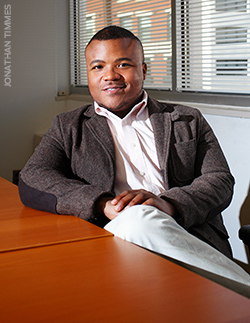 Venton Jones actually got involved in AIDS work a year before he was diagnosed with HIV. At the time, the gay, black Dallas native had just graduated from college with a bachelor’s degree in community health.
Venton Jones actually got involved in AIDS work a year before he was diagnosed with HIV. At the time, the gay, black Dallas native had just graduated from college with a bachelor’s degree in community health.
It was 2006, and “I had just started to fully understand the impact of health disparities in the black community,” Jones says. At the time, he was volunteering at a local community health center and preparing to enter the U.S. Army.
Then, right before deployment, Jones tested HIV positive. Soon after, he picked up a job as the Dallas team leader for United Black Ellument, an HIV prevention and intervention project for young men who have sex with men (MSM) in his hometown.
“That was really the first time that advocacy, in a sense, became therapy for me.” On the job, he set up safe spaces for young gay and bisexual men to talk openly about the issues that were going on in their lives.
Jones didn’t want to become another victim of the virus. Instead, he decided to help change the harsh reality for younger African-American gay men in the South.
In 2010, Jones moved to Washington, DC, to take on a larger role as the communications and education director at the National Black Gay Men’s Advocacy Coalition.
“I went to DC to learn about the policies impacting black gay men and really be able to learn how to shape it,” Jones says. That meant delving deep into the social determinants of the HIV/AIDS epidemic.
Jones, now 31, has spoken at the White House about HIV/AIDS. In 2011, President Obama officially recognized him for his role in the LGBT community. But Jones says it was bringing his HIV/AIDS work back home to Texas that really stands out as a moment of achievement.
“One of the personal highlights of my HIV career was finally disclosing to my family in 2011,” he says. “That was something I held on to for four years. It gave me the strength to keep on with what I was doing.”
Today, Jones works at the National Black Justice Coalition (NBJC) as the events and operations manager. He is one of only two openly HIV-positive NBJC staff members. He hopes to bring HIV/AIDS issues back into focus in both the organization and among his fellow gay black brothers.
“I want to deal with larger issues impacting black LGBT people,” says Jones, who is now working with NBJC to pass a federal law that would protect LGBT workers across the country. “But if we don’t have healthy communities first, we can’t have economically empowered communities.”
Justice For All






5 Comments
5 Comments